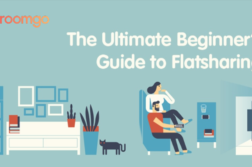What is a holding fee? What is an admin fee? Why is everyone trying to take my money before I have been given any keys!?
These are all normal, infuriating questions for anyone who rents a spareroom in London. In this painless guide, you’ll find out all about the various ways that people try to separate you with your money when attempting to rent a room.
What is a deposit?
Of the three, deposits should enter the lowest on your ‘arousing suspicion’ scale. They are pretty ubiquitous. When you move into a new private sector rental property with a private landlord, they will, 99% of the time, ask you for a deposit.
The deposit is an amount of money, usually between 4-8 weeks rents, paid up front to the landlord before moving into your new place. The money is then kept in a deposit protection scheme until the end of your tenancy (or at least, the law requires it to be). The idea is that any damages you inflict upon the property will be repaired using your deposit.
At the end of the tenancy, when you turn out to have been a perfect tenant, you should get all the deposit back. If you don’t, you can appeal to a resolution service. You should receive confirmation from your landlord shortly after paying your deposit that they have, indeed, enrolled your deposit in a protection scheme. If they don’t, you may want to seek legal advice. For more information about deposits, check Government guidelines here.
Find the newest rooms available on Roomgo
What is a holding fee?
A holding fee is a sum paid to either the landlord or a letting agent acting on their behalf. If you are shown around a property and say you want it, they might ask you to pay a holding fee. The fee is paid in order to ‘show you’re serious’ about taking the property. Once the fee is paid, they will stop accepting offers until you pay your deposit and sign the contract.
If you do sign the contract, the holding fee will usually go towards your deposit, first rent payment or other admin fees (see below). If you back out, they keep the holding fee and put the property back out onto the market.
Holding fees are fair enough in one sense – they stop agents being messed around by potential tenants who might otherwise claim to want the place, then pull out. But on the other hand, in the high-pressure rental market, prospective tenants are often scared into putting a holding fee down prematurely and then losing it.
For this reason, it’s best to view flats with all potential flatmates there, so that you can all agree whether you want to take the property whilst there, instead of needing to call people up in a high pressure scenario. It’s in the agent’s interests to put as much pressure on you as possible to take the place, since this will either end up with them keeping a holding fee or simply filling the house. Win, win for them: terrible for everyone else.
Read also:
>>>The tenant’s guide to deposits
>>> Common ways to lose your deposit
>>> Difference between holding fees, admin fees and deposits
>>>5 easy steps for a proper check-in when renting
What is an admin fee?
Landlords or their agents can charge you for their services in administrating the move: postal costs, checking your credit, getting references, etc. Usually this will be less than £100. They certainly can’t charge you simply for showing you what properties they have in their portfolio, so never pay an agent to simply be shown property.
Agents may also levy ‘check in’ or ‘check out’ fees (or both…). Surprisingly, they can do this if it is in your contract, so obviously, read your contract through thoroughly before signing. If these fees are not in your contract, you are in a strong position not to pay up when they are sprung on you.
In general, knowing your rights is the best thing you can do before becoming a tenant. If you are a student, many student unions provide free legal advice to their members. The Citizens Advice Bureau also has information on tenant rights.
If you are renting from a sub-letter you can avoid many of these fees: they might not even ask you for a deposit. This makes finding a single room in a property very popular for short-term tenants.
Whether you’re after a short-term rental or a house for the next few years, we have thousands of rooms across the country at Roomgo.







